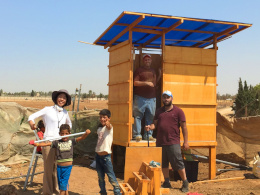The carbon footprint of flush toilets
Toilet and the toilet wastes we produce are still a taboo topic for many, but they are, indeed, greatly related to human carbon footprint. An average person produces approximately 400g faeces per day and round about 1.5 l of urine. Every time we flush, we use approximately 6.5 litres of water. That is about 5,000 l of water every year per person. To this, one can add the energy use of pumping clean water and transferring wastewater to treatment facilities.But there are many more aspects to the luxury of having a flush toilet: it gives us privacy, dignity, and it belongs to our hygienic standard today. Water closets keep potential pathogens from us, quickly deviate human waste from where we live, and limit bad odour in our homes.Unfortunately, many poor urban populations and communities in informal settlements struggle with inadequate sanitation facilities, and are exposed to health risks such as cholera and diarrheal diseases that can easily become life-threatening, especially for small children. This is why AKYAS has set out to make sanitation available for anyone in any setting, functioning with zero water and energy use, and no sewage infrastructure needed. In all of this, AKYAS is very aware that toilets are a very sensitive matter.
Fighting sanitation problems
During their humanitarian work in informal settlements in Turkey and Jordan, the AKYAS co-founders, Bara Wahbeh and Dr. Sophia Tan, quickly realized that vulnerable communities are suffering from extremely poor sanitation conditions. Reportedly, one billion slum population worldwide have little or no access to public sewage and waste disposal systems. During their daily work in informal settlements, Bara and Sophia experienced first-hand how latrine pits turned into biohazards when it rained and flooded in the camps, threatening the health of the community. At that time, the humanitarian team was unable to provide a solution to tackle the root cause of the problem, yet they learned that a typical sanitation supply chain involves costly procedures: Containment, emptying, transport and treatment by different actors.By making use of what they learned on circumstances prevailing in displaced people communities in the Middle East, Bara and Sophia, together with designer Mandy Mui and R&D engineer Al Moutaz Darwesh, set out as a team for a solution that came in the form of AKYAS [أكياس], which is the Arabic word for “bags”. And together they developed the chemical formula for a special pathogen-killing powder mix that then became the core of their start-up.The toilet innovation from AKYAS integrates all the steps in the non-sewered sanitation supply chain into one single step - an on-site wastewater treatment in a bag system. The resultant bio-products could be upcycled for various uses that address climate actions by fighting desertification and, potentially, food security. Giving back dignity and fighting desertification
AKYAS is providing a unique sanitary solution: hygienic and ergonomic toilets that do not require a sewage infrastructure and do not produce waste consisting of several toilet front-end options tailored to the user’s needs. The special bag is placed underneath a tailor-built urine-diverting toilet pan/bowl, and contains a special powder mix that can be coated in the bags, sprinkled on after toilet use, or applied via a powder doser to reach optimum distribution. The powder mix eliminates pathogens, mold, and fungus, within only 48 hours and lets faeces degrade into only carbon-base compounds, water, and non-contaminating biomass. By ending anaerobic and aerobic digestion through bacteria, the application of the bags actively reduces bad odour and methane production while removing any remaining water vapour. Via this system, 1 kg of human faeces, which contains about 80% water, shrinks to only 400-500 g in less than two weeks. What comes out of the multifunctional and completely compostable bags looks like common and odourless nutrient-rich soil that can then be used as fertilizer.
Expanding potential with top-class partners
AKYAS is currently trying to unlock the full potential of their innovation with a range of partners, amongst which also Oxfam. In January 2018, the start-up won their first competition, MIT Innovate for Refugees, and the respective monetary prize used as a seed fund to develop the core technology. In 2019, AKYAS was awarded the ExpoLive Innovation Impact Grant, which provided the team with the financial means to keep their R&D up and running. In the same year, the Toilet Board Coalition selected AKYAS to participate in the Sanitation Economy Summit as one of the 5-Star Exhibitors. The team also participated in the SDG Impact Accelerator program in Turkey with UNDP, the Bill & Melinda Gates Foundation, and the Country’s Ministry of Foreign Affairs among other partners; an implementation project with the partners is in the pipeline currently.With its innovation, AKYAS is contributing to SDG 3 (good health and well-being), SDG 6 (clean water & sanitation), SDG 11 (sustainable cities and communities), and SDG 13 (climate action). AKYAS received an honourable mention of the ISC3 Innovation Challenge for providing a regionally impactful, out-of-the-box solution, and will be pitching at the ISC3 Investor Forum from 21-23 October 2020.


